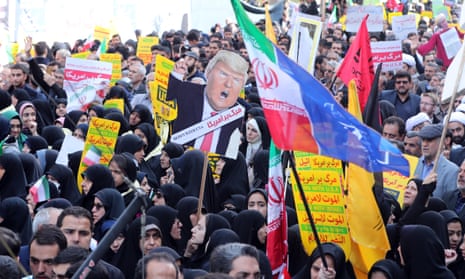Economic sanctions are state aggression. As of today, those imposed by the US against Iran are broadened to embrace any country, company or individual dealing with Tehran. A few lucky “friends” of Donald Trump – China, India, Iraq, Turkey, Korea – may escape. The EU has also promised to help companies that resist, but that may not count for much. Almost every international corporation does some business with the US. Trump’s edict that his enemy’s friend is his enemy is a declaration of war on his friends.
It is hard to think of a good reason for this action. Economic sanctions are the ultimate soft power, virtue signalling by rich states against poor ones. They supposedly work by inducing an impoverished populace to rise up and demand their government surrender. They never do, because sanctioned regimes tend by definition to be repressive. Sanctions mostly strengthen and embattle those in power – North Korea, Cuba and Iran being cases in point. Sanctions against Russia over Crimea have been utterly pointless.
Ironically Iran is one of the few places where sanctions may have had some – limited – effect, in edging Tehran towards the 2015 nuclear treaty with President Obama. That was largely because Iran retained elements of democratic accountability. That accountability must have evaporated in the US’s breach of faith. There is no evidence that Iran has reneged on its treaty undertakings. Trump protests at Iran’s support for “bad guys” across the Middle East. But that was not in the treaty, nor should it be the west’s business.
The US’s unilateral breach of the deal is not just an offence against international order, and probably law. By extending the sanctions to his allies, Trump has broken faith with them too. More serious, the sanctions will strengthen Tehran’s anti-democratic military and religious centres of power against the more liberal commercial ones. This will drive Iran further towards Russia and towards involvement in the region’s Islamist conflicts. To reactionaries, Trump is a dream American, a stupid and a belligerent one.
Economic war weakens the poor and the middle class, and strengthens autocracy. Because it is “non-violent” and largely cost-free to the aggressor, it precipitates no crisis and no pressure for resolution. The conflict just drags on, widening the gap between rich and poor states. Sanctions are the bluntest weapon in the foreign policy armoury.
The hope now must be that after this week’s congressional election, Trump will seek some deal with the ayatollahs that he can label a victory, Korea-style. If so, bring it on. For the time being, the US president is harming his allies and aiding his enemies. He is destabilising the Middle East and aggravating his wider campaign against global free trade. There is nothing good in it.

